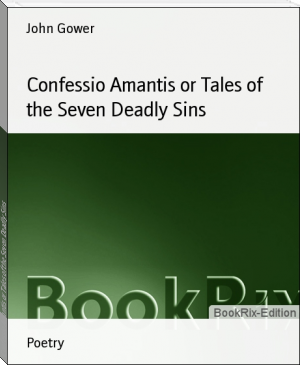Confessio Amantis or Tales of the Seven Deadly Sins by John Gower (books you have to read txt) 📖

- Author: John Gower
Book online «Confessio Amantis or Tales of the Seven Deadly Sins by John Gower (books you have to read txt) 📖». Author John Gower
Proximitatis honor sua corda veretur, et omnis
Est sibi leticia sic aliena dolor.
Hoc etenim vicium quam sepe repugnat amanti,
Non sibi, set reliquis, dum fauet ipsa Venus.
Est amor ex proprio motu fantasticus, et que
Gaudia fert alius, credit obesse sibi.
Now after Pride the secounde
Ther is, which many a woful stounde
Towardes othre berth aboute
Withinne himself and noght withoute;
For in his thoght he brenneth evere,
Whan that he wot an other levere
Or more vertuous than he,
Which passeth him in his degre;
Therof he takth his maladie:
That vice is cleped hot Envie. 10
Forthi, my Sone, if it be so
Thou art or hast ben on of tho,
As forto speke in loves cas,
If evere yit thin herte was
Sek of an other mannes hele?
So god avance my querele,
Mi fader, ye, a thousend sithe:
Whanne I have sen an other blithe
Of love, and hadde a goodly chiere,
Ethna, which brenneth yer be yere, 20
Was thanne noght so hot as I
Of thilke Sor which prively
Min hertes thoght withinne brenneth.
The Schip which on the wawes renneth,
And is forstormed and forblowe,
Is noght more peined for a throwe
Than I am thanne, whanne I se
An other which that passeth me
In that fortune of loves yifte.
Bot, fader, this I telle in schrifte, 30
That is nowher bot in o place;
For who that lese or finde grace
In other stede, it mai noght grieve:
Bot this ye mai riht wel believe,
Toward mi ladi that I serve,
Thogh that I wiste forto sterve,
Min herte is full of such sotie,
That I myself mai noght chastie.
Whan I the Court se of Cupide
Aproche unto my ladi side 40
Of hem that lusti ben and freisshe,-
Thogh it availe hem noght a reisshe,
Bot only that thei ben in speche,-
My sorwe is thanne noght to seche:
Bot whan thei rounen in hire Ere,
Than groweth al my moste fere,
And namly whan thei talen longe;
My sorwes thanne be so stronge
Of that I se hem wel at ese,
I can noght telle my desese. 50
Bot, Sire, as of my ladi selve,
Thogh sche have wowers ten or twelve,
For no mistrust I have of hire
Me grieveth noght, for certes, Sire,
I trowe, in al this world to seche,
Nis womman that in dede and speche
Woll betre avise hire what sche doth,
Ne betre, forto seie a soth,
Kepe hire honour ate alle tide,
And yit get hire a thank beside. 60
Bot natheles I am beknowe,
That whanne I se at eny throwe,
Or elles if I mai it hiere,
That sche make eny man good chiere,
Thogh I therof have noght to done,
Mi thought wol entermette him sone.
For thogh I be miselve strange,
Envie makth myn herte change,
That I am sorghfully bestad
Of that I se an other glad 70
With hire; bot of other alle,
Of love what so mai befalle,
Or that he faile or that he spede,
Therof take I bot litel heede.
Now have I seid, my fader, al
As of this point in special,
Als ferforthli as I have wist.
Now axeth further what you list.
Mi Sone, er I axe eny more,
I thenke somdiel for thi lore 80
Telle an ensample of this matiere
Touchende Envie, as thou schalt hiere.
Write in Civile this I finde:
Thogh it be noght the houndes kinde
To ete chaf, yit wol he werne
An Oxe which comth to the berne,
Therof to taken eny fode.
And thus, who that it understode,
It stant of love in many place:
Who that is out of loves grace 90
And mai himselven noght availe,
He wolde an other scholde faile;
And if he may put eny lette,
He doth al that he mai to lette.
Wherof I finde, as thou schalt wite,
To this pourpos a tale write.
Ther ben of suche mo than twelve,
That ben noght able as of hemselve
To gete love, and for Envie
Upon alle othre thei aspie; 100
And for hem lacketh that thei wolde,
Thei kepte that non other scholde
Touchende of love his cause spede:
Wherof a gret ensample I rede,
Which unto this matiere acordeth,
As Ovide in his bok recordeth,
How Poliphemus whilom wroghte,
Whan that he Galathee besoghte
Of love, which he mai noght lacche.
That made him forto waite and wacche 110
Be alle weies how it ferde,
Til ate laste he knew and herde
How that an other hadde leve
To love there as he mot leve,
As forto speke of eny sped:
So that he knew non other red,
Bot forto wayten upon alle,
Til he may se the chance falle
That he hire love myhte grieve,
Which he himself mai noght achieve. 120
This Galathee, seith the Poete,
Above alle othre was unmete
Of beaute, that men thanne knewe,
And hadde a lusti love and trewe,
A Bacheler in his degree,
Riht such an other as was sche,
On whom sche hath hire herte set,
So that it myhte noght be let
For yifte ne for no beheste,
That sche ne was al at his heste. 130
This yonge knyht Acis was hote,
Which hire ayeinward als so hote
Al only loveth and nomo.
Hierof was Poliphemus wo
Thurgh pure Envie, and evere aspide,
And waiteth upon every side,
Whan he togedre myhte se
This yonge Acis with Galathe.
So longe he waiteth to and fro,
Til ate laste he fond hem tuo, 140
In prive place wher thei stode
To speke and have here wordes goode.
The place wher as he hem syh,
It was under a banke nyh
The grete See, and he above
Stod and behield the lusti love
Which ech of hem to other made
With goodly chiere and wordes glade,
That al his herte hath set afyre
Of pure Envie: and as a fyre 150
Which fleth out of a myhti bowe,
Aweie he fledde for a throwe,
As he that was for love wod,
Whan that he sih how that it stod.
This Polipheme a Geant was;
And whan he sih the sothe cas,
How Galathee him hath forsake
And Acis to hire love take,
His herte mai it noght forbere
That he ne roreth lich a Bere; 160
And as it were a wilde beste,
The whom no reson mihte areste,
He ran Ethna the hell aboute,
Wher nevere yit the fyr was oute,
Fulfild of sorghe and gret desese,
That he syh Acis wel at ese.
Til ate laste he him bethoghte,
As he which al Envie soghte,
And torneth to the banke ayein,
Wher he with Galathee hath seyn 170
Acis, whom that he thoghte grieve,
Thogh he himself mai noght relieve.
This Geant with his ruide myht
Part of the banke he schof doun riht,
The which evene upon Acis fell,
So that with fallinge of this hell
This Poliphemus Acis slowh,
Wherof sche made sorwe ynowh.
And as sche fledde fro the londe,
Neptunus tok hire into honde 180
And kept hire in so sauf a place
Fro Polipheme and his manace,
That he with al his false Envie
Ne mihte atteigne hir compaignie.
This Galathee of whom I speke,
That of hirself mai noght be wreke,
Withouten eny semblant feigned
Sche hath hire loves deth compleigned,
And with hire sorwe and with hire wo
Sche hath the goddes moeved so, 190
That thei of pite and of grace
Have Acis in the same place,
Ther he lai ded, into a welle
Transformed, as the bokes telle,
With freisshe stremes and with cliere,
As he whilom with lusti chiere
Was freissh his love forto qweme.
And with this ruide Polipheme
For his Envie and for his hate
Thei were wrothe. And thus algate, 200
Mi Sone, thou myht understonde,
That if thou wolt in grace stonde
With love, thou most leve Envie:
And as thou wolt for thi partie
Toward thi love stonde fre,
So most thou soffre an other be,
What so befalle upon the chaunce:
For it is an unwys vengance,
Which to non other man is lief,
And is unto himselve grief. 210
Mi fader, this ensample is good;
Bot how so evere that it stod
With Poliphemes love as tho,
It schal noght stonde with me so,
To worchen eny felonie
In love for no such Envie.
Forthi if ther oght elles be,
Now axeth forth, in what degre
It is, and I me schal confesse
With schrifte unto youre holinesse. 220
Mi goode Sone, yit ther is
A vice revers unto this,
Which envious takth his gladnesse
Of that he seth the hevinesse
Of othre men: for his welfare
Is whanne he wot an other care:
Of that an other hath a fall,
He thenkth himself arist withal.
Such is the gladschipe of Envie
In worldes thing, and in partie 230
Fulofte times ek also
In loves cause it stant riht so.
If thou, my Sone, hast joie had,
Whan thou an other sihe unglad,
Schrif the therof. Mi fader, yis:
I am beknowe unto you this.
Of these lovers that loven streyte,
And for that point which thei coveite
Ben poursuiantz fro yeer to yere
In loves Court, whan I may hiere 240
How that thei clymbe upon the whel,
And whan thei wene al schal be wel,
Thei ben doun throwen ate laste,
Thanne am I fedd of that thei faste,
And lawhe of that I se hem loure;
And thus of that thei brewe soure
I drinke swete, and am wel esed
Of that I wot thei ben desesed.
Bot this which I you telle hiere
Is only for my lady diere; 250
That for non other that I knowe
Me reccheth noght who overthrowe,
Ne who that stonde in love upriht:
Bot be he squier, be he knyht,
Which to my ladiward poursuieth,
The more he lest of that he suieth,
The mor me thenketh that I winne,
And am the more glad withinne
Of that I wot him sorwe endure.
For evere upon such aventure 260
It is a confort, as men sein,
To him the which is wo besein
To sen an other in his peine,
So that thei bothe mai compleigne.
Wher I miself mai noght availe
To sen an other man travaile,
I am riht glad if he be let;
And thogh I fare noght the bet,
His sorwe is to myn herte a game:
Whan that I knowe it is the same 270
Which to mi ladi stant enclined,
And hath his love noght termined,
I am riht joifull in my thoght.
If such Envie grieveth oght,
As I beknowe me coupable,
Ye that be wys and resonable,
Mi fader, telleth youre avis.
Mi Sone, Envie into no pris
Of such a forme, I understonde,
Ne mihte be no resoun stonde 280
For this Envie hath such a kinde,
That he wole sette himself behinde
To hindre with an othre wyht,
And gladly lese his oghne riht
To make an other lesen his.
And forto knowe how it so is,
A tale lich to this matiere
I thenke telle, if thou wolt hiere,
To schewe proprely the
 The unity of form and content is what distinguishes poetry from other areas of creativity. However, this is precisely what titanic work implies.
The unity of form and content is what distinguishes poetry from other areas of creativity. However, this is precisely what titanic work implies. 




Comments (0)